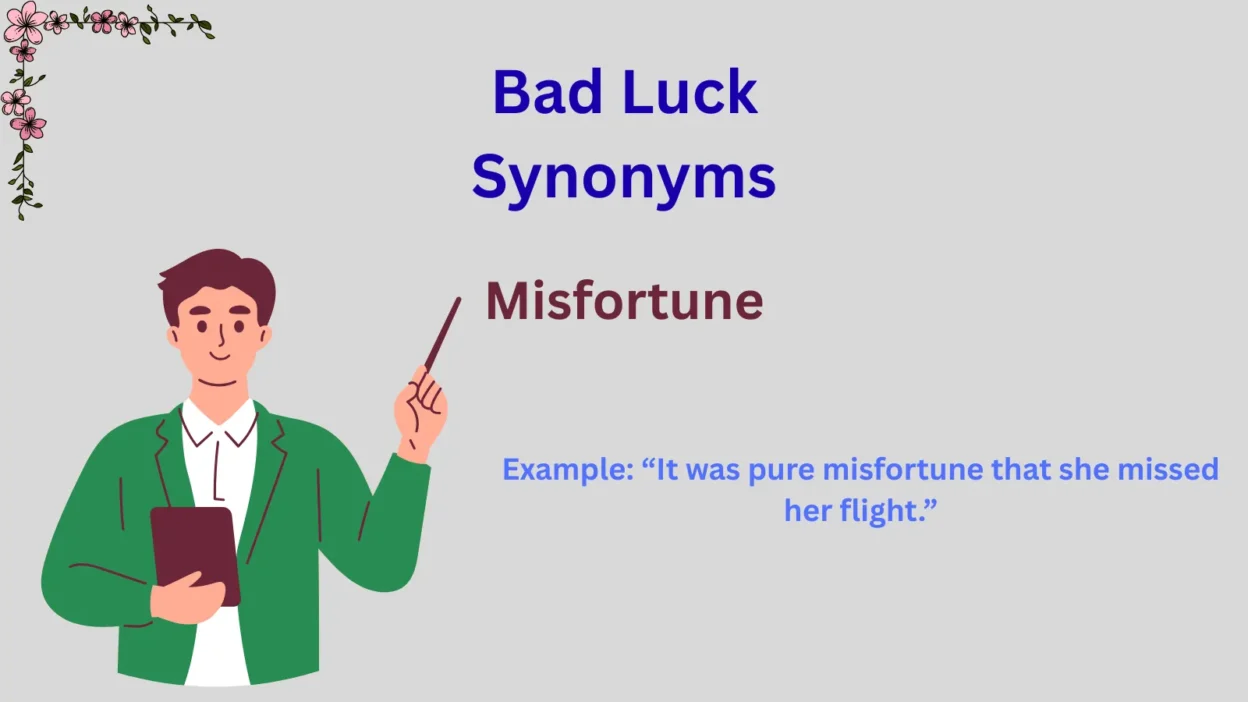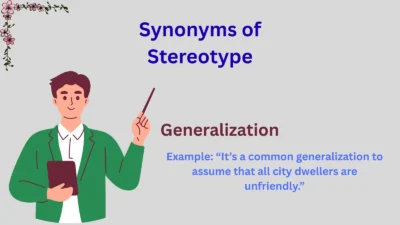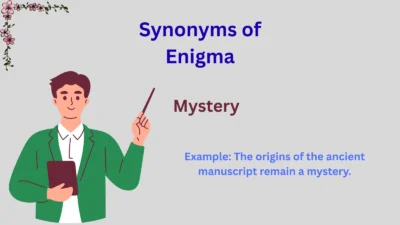Bad Luck Synonyms, such as misfortune, adversity, and misadventure, describe situations where events turn against someone unexpectedly. For example, misfortune can refer to unlucky circumstances, while a misadventure often involves an unexpected or minor accident.
Using the right synonym for bad luck helps you express different degrees and types of unfortunate events. Each term carries its own nuance — misfortune feels general and serious, adversity emphasizes challenges or hardship, and misadventure often conveys a lighter, sometimes humorous setback.
If you’re writing about life challenges, storytelling, or reflective narratives, choosing precise synonyms for bad luck adds clarity and emotional depth to your content. In this guide, we’ll explore alternatives, their meanings, and how to use them effectively.
What Does Bad Luck Mean?
Bad luck refers to situations where events happen against someone’s favor, often unexpectedly and beyond their control. It represents moments when chance or circumstance creates misfortune, hardship, or setbacks.
Bad luck can manifest as:
- Misfortune – serious or unlucky circumstances that negatively affect someone
- Adversity – challenges or hardships that test resilience
- Misadventure – unexpected mishaps or accidents, often minor or humorous
- Setbacks – temporary obstacles that prevent progress
It’s not just about being unlucky — bad luck captures the unpredictability of life and the challenges that arise from circumstances outside one’s control. Understanding its nuances allows writers to convey emotion, tension, and realism in storytelling or descriptive writing.
30 Synonyms & Related Words for Bad Luck
1. Misfortune
Description: General term for bad luck or adversity.
Example: “It was pure misfortune that she missed her flight.”
Usage: Neutral to formal; widely applicable.
2. Ill fortune
Description: Bad luck with a slightly literary or old-fashioned tone.
Example: “He faced ill fortune after losing his job unexpectedly.”
Usage: Formal or dramatic contexts; conveys moral or narrative weight.
3. Adversity
Description: Difficulties or misfortune in life.
Example: “She overcame great adversity to succeed in her career.”
Usage: Formal or inspirational; focuses on challenge rather than mere chance.
4. Hardship
Description: Severe misfortune, often long-term.
Example: “The family endured financial hardship after the storm.”
Usage: Serious, empathetic tone; emphasizes struggle.
5. Setback
Description: A temporary obstacle or reversal of progress.
Example: “The injury was a major setback for the athlete.”
Usage: Neutral; common in professional, academic, or casual contexts.
6. Curse
Description: Misfortune is believed to be caused by supernatural forces.
Example: “He felt as if he were under a curse after the repeated failures.”
Usage: Dramatic or literary; can be humorous or metaphorical in casual speech.
7. Ill luck
Description: Common expression for unfortunate circumstances.
Example: “She had the ill luck to meet the wrong people that day.”
Usage: Informal or neutral; widely understood.
8. Misadventure
Description: An unfortunate event or accident, often minor or unintended.
Example: “His misadventure on the hike left him with a sprained ankle.”
Usage: Literary or formal; conveys accidental misfortune.
9. Trouble
Description: Problems or difficulties that arise unexpectedly.
Example: “He got into trouble due to a series of miscalculations.”
Usage: Informal to neutral; versatile across contexts.
10. Unluckiness
Description: The quality or state of experiencing bad luck.
Example: “Her unluckiness at the casino was legendary.”
Usage: Casual or descriptive; mild tone.
11. Calamity
Description: A disastrous or catastrophic event.
Example: “The flood was a calamity that destroyed the village.”
Usage: Formal, dramatic; suitable for serious misfortune.
12. Disaster
Description: Sudden event causing great harm or loss.
Example: “The failed project was a disaster for the team.”
Usage: Neutral to dramatic; widely used.
13. Mischance
Description: A chance occurrence of misfortune.
Example: “By mischance, he lost his wallet on the train.”
Usage: Literary or formal; emphasizes randomness.
14. Adverse fate
Description: Bad luck framed as inevitable destiny.
Example: “Adverse fate seemed to follow him wherever he went.”
Usage: Dramatic, literary; conveys inevitability.
15. Doom
Description: Inevitable misfortune or ruin.
Example: “They believed doom awaited the reckless adventurers.”
Usage: Dramatic, often figurative; moralistic or suspenseful tone.
16. Misery
Description: Suffering caused by bad luck or circumstances.
Example: “His life was filled with financial misery after the business failed.”
Usage: Emotional, empathetic; emphasizes impact.
17. Affliction
Description: Cause of pain, suffering, or misfortune.
Example: “The disease was an affliction that struck the community.”
Usage: Formal, empathetic; medical or literary contexts.
18. Tribulation
Description: A severe trial or challenge, often involving bad luck.
Example: “They faced tribulation during the harsh winter.”
Usage: Formal, literary, or historical; conveys endurance and struggle.
19. Reverse of fortune
Description: Change from good to bad luck or circumstances.
Example: “The business experienced a sudden reversal of fortune.”
Usage: Formal or narrative; good for storytelling or news.
20. Bad break
Description: Informal term for unfortunate events.
Example: “It was a bad break that his car broke down on the highway.”
Usage: Casual, conversational; mild tone.
21. Downturn
Description: Decline in fortune or circumstances.
Example: “The economy experienced a downturn affecting many families.”
Usage: Neutral, formal; often used in business or economic contexts.
22. Ill-starred
Description: Destined for misfortune, often literary.
Example: “The ill-starred expedition failed before reaching the summit.”
Usage: Literary, dramatic; conveys inevitability.
23. Jinx
Description: A person, thing, or event believed to bring bad luck.
Example: “They thought the old house was a jinx on the family.”
Usage: Informal, humorous; can be superstitious.
24. Misery-making
Description: Causing bad luck or unhappiness.
Example: “His constant mistakes were misery-making for the team.”
Usage: Informal to semi-formal; emphasizes negative impact.
25. Mishap
Description: Minor accident or misfortune.
Example: “A small mishap in the kitchen led to a burnt cake.”
Usage: Casual, neutral; conveys light or minor trouble.
26. Catastrophe
Description: Large-scale disaster or severe misfortune.
Example: “The hurricane was a catastrophe for the coastal town.”
Usage: Formal, dramatic; emphasizes seriousness.
27. Ill-fortune
Description: Another expression for unlucky events.
Example: “Ill-fortune seemed to follow the young entrepreneur.”
Usage: Literary or formal; interchangeable with bad luck.
28. Fiasco
Description: Complete failure or disaster.
Example: “The dinner party turned into a fiasco after the power went out.”
Usage: Informal to semi-formal; dramatic or humorous depending on context.
29. Mishap
Description: Accident or small misfortune.
Example: “A minor mishap delayed the start of the event.”
Usage: Neutral, light; emphasizes minor, unintended misfortune.
30. Hard knock
Description: Informal term for tough experiences caused by misfortune.
Example: “He learned many lessons from the hard knocks of life.”
Usage: Casual, conversational; emphasizes resilience and life experience.
How to Choose the Right Synonym
- Formal/Literary: Words like adversity, tribulation, mischance, ill-starred, and doom work well in essays, novels, or dramatic writing.
- Casual/Conversational: Words like bad break, jinx, hard knock, and mishap fit everyday speech or storytelling.
- Dramatic/Serious: Terms like catastrophe, calamity, disaster, and reverse of fortune convey intense or large-scale misfortune.
- Empathetic/Emotional: Misery, affliction, and hardship emphasize the human impact of bad luck.
- Humorous/Light: Fiasco, bad break, and jinx can describe unlucky events with a playful or relatable tone.
Cultural context also matters. Some words, like doom, curse, or ill-starred, may feel archaic or literary, while jinx and bad break are modern and widely understood.
Conclusion :
Exploring Bad Luck Synonyms helps you describe life’s challenges, unexpected setbacks, and unlucky circumstances with precision. Words like hard knock, misfortune, and mishap each convey a different shade — hard knock emphasizes tough lessons, misfortune highlights serious unlucky events, and mishap suggests minor accidents or blunders.
Using the right synonym allows you to capture tone and context, whether writing about personal experiences, storytelling, or reflections on adversity. These alternatives make your descriptions vivid, relatable, and engaging, helping readers understand the nuances of bad luck.



